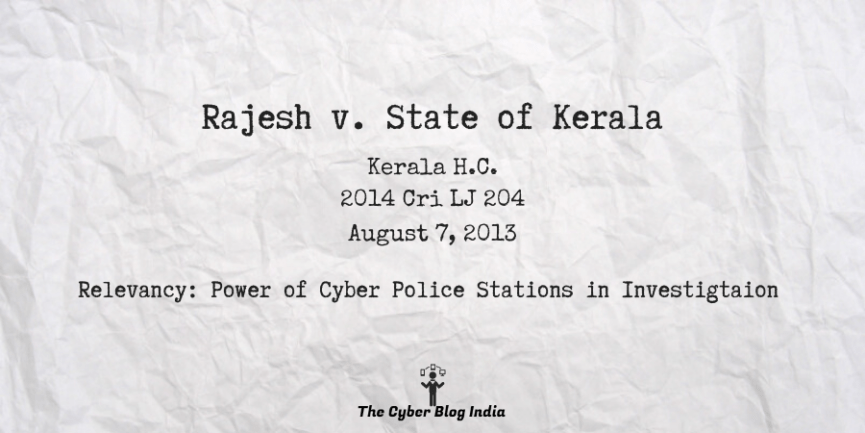Rajesh v. State of Kerala

Rajesh v. State of Kerala
2014 Cri LJ 204
In the High Court of Kerala
Cr. R.P. 10/2013
Before Justice K. Harilal
Decided on August 7, 2013
Relevancy of the case: Power of Cyber Police Stations in Investigation.
Statutes & Provisions Involved
- The Information Technology Act, 2000 (Section 4, 5, 66, 78)
- The Indian Penal Code, 1860 (Section 420, 379, 34)
- Code of Criminal Procedure, 1973 (Section 156, 177, 239)
Relevant Facts of the Case
- The petitioner/accused, an Assistant Manager of the Zonal Office of the State Bank of Travancore filed a revision petition under Section 66 of the Information Technology Act, 2000 and Sections 420, 379 read with Section 34 of the Indian Penal Code, 1860.
- This case was transferred to the Cyber Police Station. The Circle Inspector of Police, Cyber Police Station produced a final report before the Judicial Magistrate First Class against the accused alleging charges under section 469 of the Indian Penal Code, 1860. Hence, this deleted the offences punishable under Section 66 of the Information Technology Act, 2000 and all other punishable offences under the Indian Penal Code, 1860.
- It was alleged that the accused/revision petitioner forged an electronic record in the name of the entrepreneur by the name ‘V.K. Ibrahim and Sons’ which was not in existence, from an internet café owned by someone else. Thus, by causing a loss of reputation to the bank by sending the above message using the forged e-mail address, the accused committed an offence punishable under Section 469 of the Indian Penal Code, 1860.
- Subsequently, the revision petition seeks the prosecution’s discharge that the Cyber Police Station has no authority to file a final report with charges against him for the offence punishable under Section 469 of the Indian Penal Code, 1860 alone.
- In addition, The accused also challenges the trial court’s impugned judgment for dismissing the petition.
Opinion of the Bench
- The bench perused the explanatory note attached to the Government’s notification, which clarifies that the “Cyber Police Stations shall investigate any offence committed under the Information Technology Act, 2000.” It shows that the maxim “expressio unius est exclusion alterius”, i.e., the express mention of one thing implies the exclusion of another, confines the notification. Hence, an implied exclusion of the investigation of all other offences from the purview of the Cyber Police Station Kerala is inherent in the notification itself.
- Furthermore, per Bhanuprasad v. State of Gujarat, a Cyber Police Station can’t file a charge sheet under the Indian Penal Code, 1860. If a police officer having no power or authority has filed a final report, it is incurable in all respects.
- Therefore, the bench observed that the Cyber Police Station had no authority to investigate offences outside the IT Act. Hence, it follows that it shall not file a final report in the absence of any offence under the IT Act.
- Hence, it would be futile for the prosecution to continue with the case. Moreover, there are no offences explicitly mentioned for the prosecution to investigate.
Final Decision
- The bench thus, set aside the impugned judgment and allowed the petition.
To read this case summary in Hindi, click here. | इस केस सारांश को हिंदी में पढ़ने के लिए यहाँ क्लिक करें।
